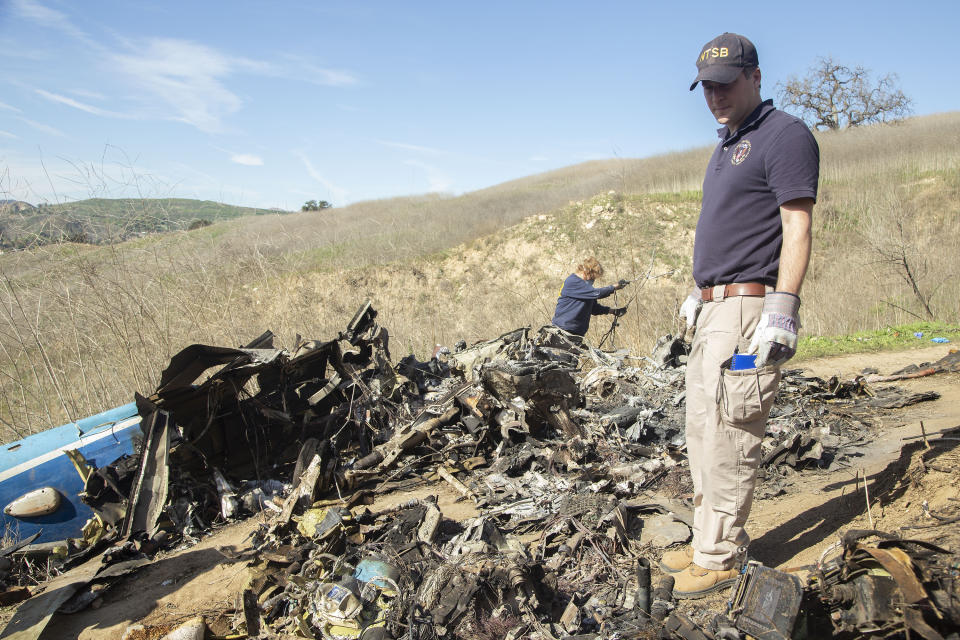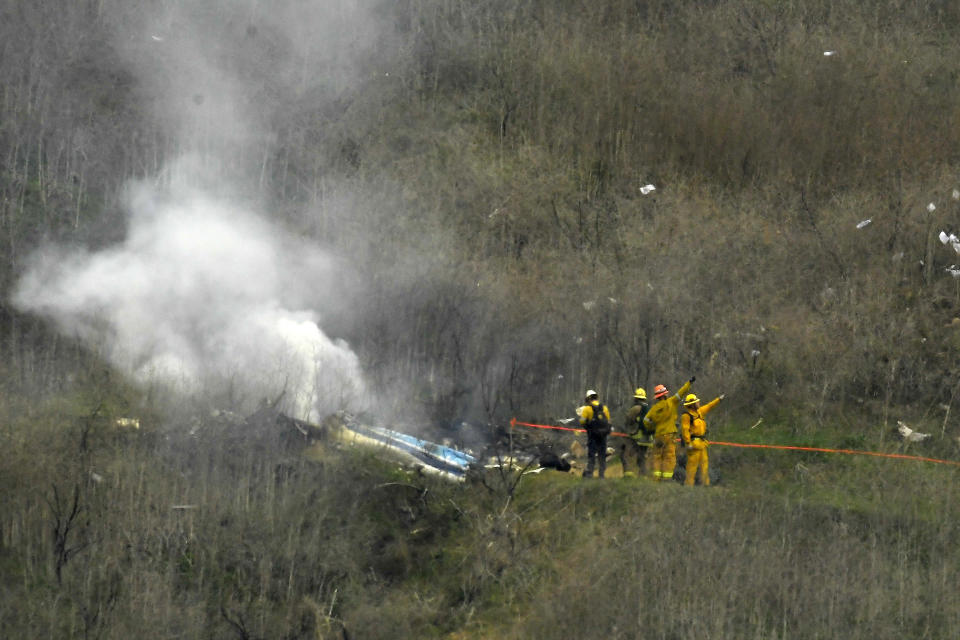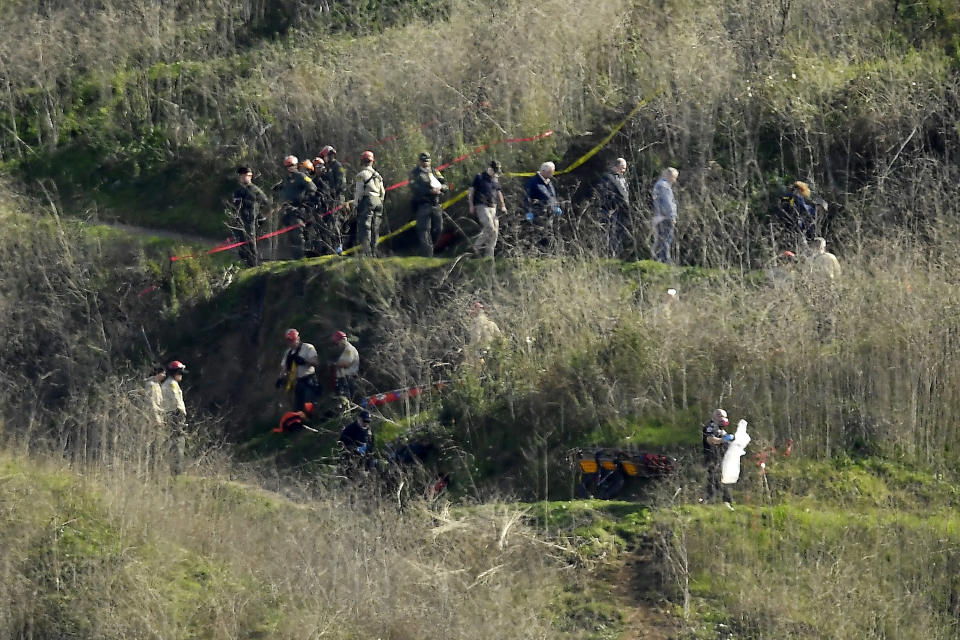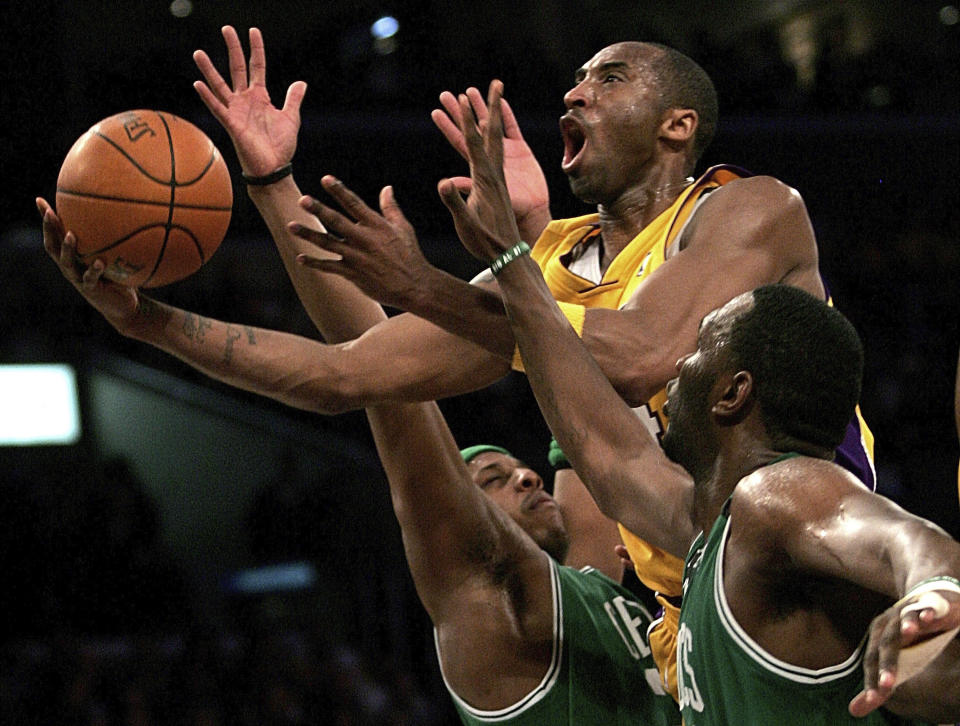Probe: Kobe Bryant pilot may have become disoriented in fog
LOS ANGELES (AP) — The pilot of the helicopter that crashed in thick fog, killing Kobe Bryant and seven other passengers, reported the aircraft was ascending when it actually was heading for the ground, federal investigators said in documents released Wednesday.
Ara Zobayan radioed to air traffic controllers that he was climbing to 4,000 feet (1,220 meters) to get above clouds on Jan. 26 when, in fact, the chopper was plunging toward a hillside where it crashed northwest of Los Angeles, killing all nine people aboard.
The report by the National Transportation Safety Board said Zobayan may have “misperceived” the angles at which he was descending and banking, which can happen when a pilot becomes disoriented in low visibility.
“Calculated apparent angles at this time show that the pilot could have misperceived both pitch and roll angles,” one report stated. "During the final descent the pilot, responding to (air traffic control), stated that they were ‘climbing to four thousand.’”
John Cox, an aviation safety consultant, said the helicopter’s erratic flight path — the aircraft slowed, climbed, then banked to one side while sinking rapidly — are telltale signs of a pilot becoming disoriented in conditions that make it hard to see terrain or the horizon.
“He is not the first person to experience it,” Cox said. “It’s a significant cause of accidents.”
The 1,700 pages of reports do not offer a conclusion of what caused the crash but compile factual reports. A final report on the cause is due later.
The NTSB said there was no sign of engine failure in the Sikorsky S-76 and the rotor was spinning just before it hit the ground at about 184 mph (296 kph). The impact caused a crater and scattered debris over an area the size of a football field in the Calabasas hills. Flames engulfed the wreckage.
Bryant, his 13-year-old daughter, Gianna, and six of their friends were killed, along with Zobayan.
About 45 minutes before takeoff, Zobayan had texted a group of people overseeing the flight that the weather was looking “OK.” Richard Webb, owner of OC Helicopters, which booked the flight, agreed.
Zobayan took off from John Wayne Airport in Orange County at 9:06 a.m. with the eight passengers he had flown the day before to the same destination: a girls basketball tournament at the retired Lakers star’s Mamba Sports Academy in Thousand Oaks.
When the helicopter hadn’t landed within an hour, an executive of the company that operated the aircraft began a frantic search for it on tracking software and had another company chopper dispatched to look for it.
“The weird thing, though, is that the tracker had stopped at 9:45 a.m. which is not normal and we were trying to reach Ara over the radio,” noted Whitney Bagge, vice president of Island Express Helicopters. “I kept refreshing the tracker praying that it was just broken.”
Four current and one former pilot for Island Express were interviewed by NTSB investigators and while some praised the company, others said the safety culture could have been better, according to the reports.
One pilot said Zobayan, the company’s chief pilot, didn’t discuss safety policy or the minimum visibility needed to fly in certain weather. Another comment said the company didn’t have a real safety management program.
The company, however, said it had no problem canceling flights if weather was poor. It cited six flights it canceled for Los Angeles Clippers star Kawhi Leonard and one for celebrity Kylie Jenner that would have used the same helicopter.
Cate Brady, a personal assistant to Bryant, told NTSB investigators that he never complained or pushed back if his flights were canceled.
Island Express reported 150 flight cancellations due to weather last year. There were 13 cancellations due to weather for 2020, all logged in the two days before Bryant’s fatal flight.
The afternoon before the flight — after returning the Bryants and their guests to Orange County — Zobayan had texted that he had just checked the weather for his next flight and it was “not the best day tomorrow but it is not as bad as today.”
The flight departure Saturday morning had been delayed by weather by 15 minutes, Brady said.
Brady said the original flight time for Sunday was 9:45 a.m., but Bryant had it rescheduled to 9 a.m. because he wanted to see another team play before his daughter's game.
Bryant’s widow, Vanessa, has sued the pilot, Island Express and the owner of the craft for negligence. In the lawsuit, filed in February as a star-studded public memorial was held before 20,000 people at Staples Center, where Bryant played most of his career, Vanessa Bryant said the pilot shouldn’t have flown in those conditions and should have aborted the flight.
Zobayan’s brother responded in a court filing that Kobe Bryant knew the risks of helicopter flying and his survivors aren’t entitled to damages from the pilot’s estate. Island Express Helicopters Inc. has denied responsibility, calling the crash “an act of God” beyond its control.
Autopsies released last month showed Zobayan did not have drugs or alcohol in his system at the time of the crash. The coroner’s reports said all nine aboard died from the impact, not the fire that followed.
The others killed were Orange Coast College baseball coach John Altobelli, his wife, Keri, and their daughter Alyssa; Christina Mauser, who helped Bryant coach his daughter’s basketball team; and Sarah Chester and her daughter Payton. Alyssa and Payton were Gianna’s teammates.
One of the 40 documents posted by the NTSB includes a 215-page safety report that concludes with an article written by the former president of the Helicopter Association International titled “Land the damned helicopter.”
The late Matt Zuccaro wrote the commentary in 2013 after becoming frustrated reading NTSB crash reports and noting that most could have been prevented by a pilot deciding to land as fuel ran low or weather deteriorated.
“Why don’t pilots exercise one of the most unique and valuable capabilities of vertical flight — namely, land the damn helicopter!" Zuccaro wrote. "In a high percentage of crashes, this simple act would break the chain of events and prevent the accident.”
The article was included without any comment from investigators.
___
Koenig reported from Dallas. Associated Press journalists Stefanie Dazio and Christopher Weber in Los Angeles contributed.






